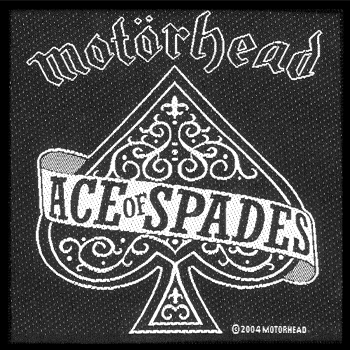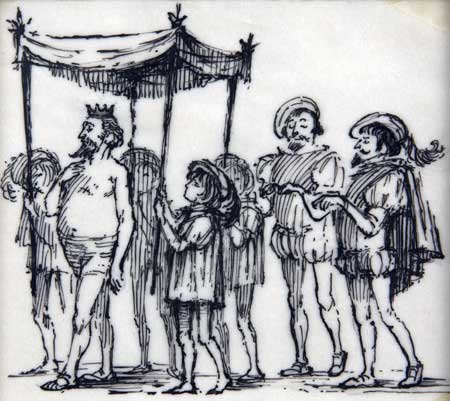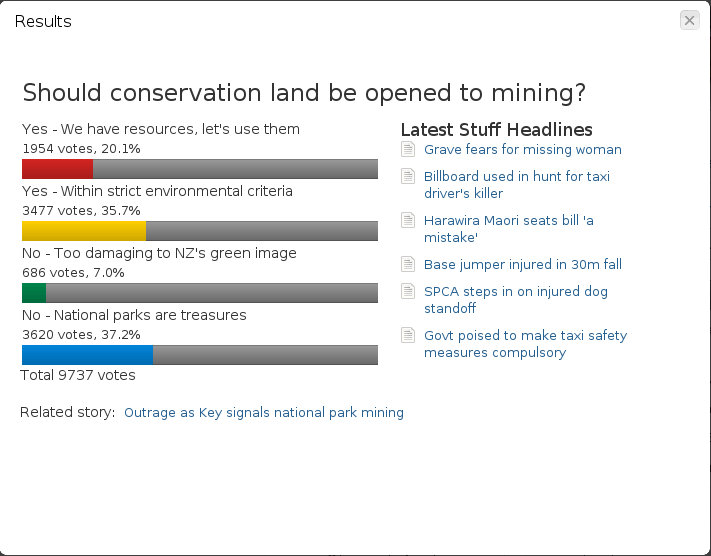Like many others, I was amazed at the turnout for the anti-mining protest in Auckland on Saturday. That 50,000 people would turn out for such an event is remarkable in itself — the NZRU’s financial problems would be solved if they could attract so many people to half a dozen rugby matches each year, and we’re currently rebuilding Eden Park so they can seat that many a dozen or so times next year, and then maybe once or twice a year thereafter.
But the more remarkable thing about this march was its apparently organic nature. From my read — based only on the media coverage, mind — this was not a visually and ideologically cohesive, “branded” demonstration such as “enough is enough” and the more recent child discipline march, which were more or less Boobs On Bikes without the boobs or the bikes, advocating the wholesale adoption of a political product. It was not a heavily stage-managed piece of public theatre as the Foreshore and Seabed hÄ«koi was, and it was not a set-piece undertaken with a specific tactical purpose such as the most memorable marches of the Springbok Tour were. There were t-shirts and banners and so on, but these were not issued like uniforms with marching orders and approved wording for slogans, imagery and talking points. These were not rented crowds, seas of mime-like bodies serving as a vehicle for someone else’s words and sentiments. This was a genuine all-comers march, and if its almost unprecedented turnout did not bring genuine authority, then its authenticity surely must.
The response from the usual authoritarians has been a heady blend of confusion, disbelief and denial — the same sorts of delusions I normally accuse Labour partisans of falling prey to, when the observable data fails to conform to ideological modelling. This is bad for them, and good for those who oppose the government’s mining plans: if the government persists in believing the models instead of the data, it will go the way of the last government which did so.
But I don’t think this government will do that. I think it will see the writing on the wall, and reframe the mineral debate. Key and Brownlee have surely now seen their error: addressing mining in Schedule 4 as a national economic development issue rather than as a set of regional development issues. Going for it all in one bite was greedy, and as Danyl says, reflects the sort of complacency which creeps in when your opposition isn’t up to the task of opposing. But as strong and authentic as the Auckland march was, it has a weakness, and that’s that it’s composed of Aucklanders. Mining schedule 4 as a national strategy has failed, and likely at the cost of the opportunity to mine in the Coromandel and on Great Barrier Island, but it has thrown into sharp relief those areas where local views are less opposed — such as Paparoa, and possibly Mt Aspiring. As I commented on The Standard earlier, West Coasters are overwhelmingly in support of extended mining, a solid turnout in Nelson notwithstanding. Portraying Nelsonites as latte-sipping greeny liberal lifestylers begrudging their honest hard-working brethren on the other side of the hill a chance at the riches of the land will turn this into a classic town/country divide of the sort National and its mining allies are very skilled at exploiting. So watch for a few hundred — or maybe a thousand — Coasters marching in Westport to support the mining proposal being equated to this weekend’s demonstration in Auckland, and watch for well-meaning Aucklanders, Wellingtonians, Nelsonites and those from elsewhere being told in fairly certain terms to butt out of their regional business.
The government will be taking a risk if it proceeds with this plan, even in a regional form, because it has already permitted the debate to be established as a national issue about national parks in which everyone from the Cape to the Bluff has a stake — but it has amassed plenty of political capital, and now is the time in the electoral cycle to use it. Particularly with the Australian federal government unveiling a new resource tax, New Zealand just got more attractive for mining interests, and the imperative to dig, baby, dig will be stronger than ever.
L








